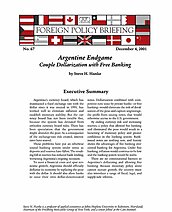Argentina’s currency board, which has maintained a fixed exchange rate with the dollar since it was created in 1991, has worked well to eliminate inflation and establish monetary stability. But the currency board has not been trouble free, because the system has deviated from orthodox currency board rules. There has been speculation that the government might abandon the peso. As a consequence of the exchange-rate risk created, interest rates have soared.
Those problems have put an otherwise sound banking system under stress as deposits and reserves have fallen. The resulting fall in reserves has reduced bank lending, worsening Argentina’s ongoing recession.
To avert a financial crisis and spur economic growth, Argentina should officially dollarize its economy by replacing the peso with the dollar. It should also allow banks to issue their own dollar-denominated notes. Dollarization combined with competitive note issue by private banks–or free banking–would eliminate the risk of devaluation of the peso and capture seigniorage, the profit from issuing notes, that would otherwise accrue to the U.S. government.
By ending currency risk and increasing reserves, a policy that allowed free banking and eliminated the peso would result in a loosening of monetary policy and greater confidence in the banking system. Bank-issued notes are nothing new, and history shows the advantages of free banking over central banking for Argentina. Under free banking, inflation would continue to be low and the banking system would be stable.
There are no constitutional barriers to Argentina’s dollarizing and allowing free banking. Because monetary policy alone cannot sustain growth, the country must also introduce a range of fiscal, legal, and supply-side reforms.

This work is licensed under a Creative Commons Attribution-NonCommercial-ShareAlike 4.0 International License.

